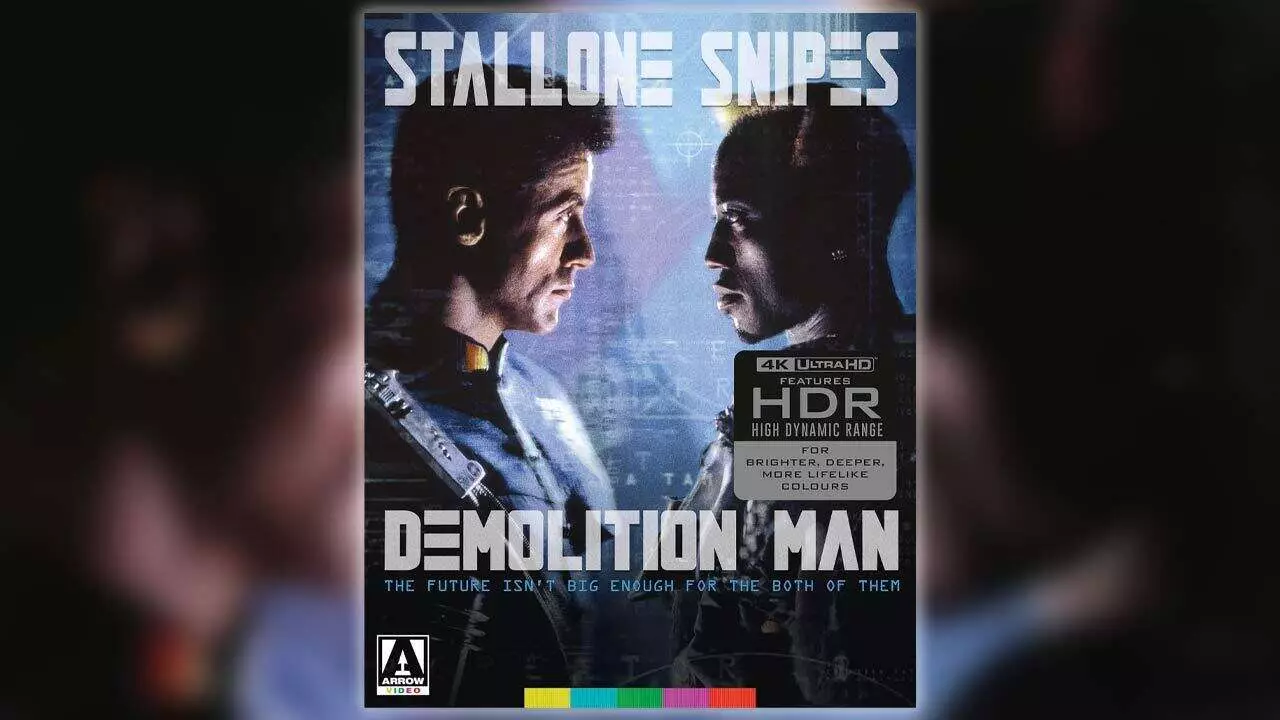The 1993 film “Demolition Man,” directed by Marco Brambilla and starring action icons Sylvester Stallone and Wesley Snipes, is not just another relic from the past; it stands as a cultural touchstone that reflects societal anxieties and anticipations from its era. As we approach the release of Arrow Video’s 4K Limited Edition on December 17, it’s worth examining why this film continues to resonate with audiences and how its restoration will reintroduce it to a new generation of viewers.
At its core, “Demolition Man” presents a dystopian future that is both absurd and eerily prescient. Set in a sanitized 2032, it explores themes of authoritarianism, consumerism, and the paradox of technological advancement. John Spartan, a tough-as-nails police officer, is cryogenically frozen after a botched rescue. Fast forward decades later, and the city of San Angeles, devoid of crime yet crippled by political correctness, must confront the wrath of Simon Phoenix, a sociopathic criminal who has been thawed after decades in stasis. This set-up not only allows for high-octane action but also serves as a commentary on the evolution of law enforcement and societal norms.
The film’s depiction of a future where Taco Bell is the sole survivor of the “Franchise Wars” juxtaposes absurdity with a critique of corporate monopolization—a notion that is increasingly relevant in today’s fast-food landscape. Furthermore, its exploration of violence, morality, and the implications of a society that has outlawed conflict challenges viewers to ponder the limits of civility.
The imminent 4K restoration, praised for its meticulous attention to detail, offers a fresh perspective on a beloved classic. This version, overseen by Brambilla himself, promises to enhance the visual fidelity while retaining the film’s original intent. Mirroring the advances in contemporary film restoration technology, this remaster will likely breathe new life into the visual elements that made the original standout in 1993.
Interestingly, the release will feature both the Taco Bell and Pizza Hut cuts, highlighting the film’s unique place in cinematic experience. This distinction is especially relevant for those interested in the sociocultural implications of branding—how portrayal can shift based on geographic and cultural context. The shift from Taco Bell to Pizza Hut in international releases is not merely a marketing decision; it underscores the varying interpretations of American culture across the globe.
Arrow Video is outdoing itself with the 4K Limited Edition, offering a treasure trove of collectibles that will delight fans and collectors alike. The oversized box includes a 60-page collector’s book filled with insights from film critics and industry insiders, allowing for a richer understanding of the film’s impact. Added bonuses like the double-sided poster and art postcards aesthetically encapsulate the film’s visual style while igniting nostalgia for long-time fans.
In terms of special features, the new content promises a blend of fresh takes and legacy features, making it a definitive version for both newcomers and veterans. Commentary from Brambilla and screenwriter Daniel Waters provides a window into the filmmaking process, while interviews with key creatives offer invaluable insights into the artistic decisions that shaped the film. The inclusion of historical commentaries and behind-the-scenes documentaries enriches the way audiences engage with the text of the film itself.
Ultimately, “Demolition Man” stands the test of time because it deftly intertwines humor, action, and sociocultural critique. Its exploration of dystopian themes, paradoxes of progress, and the implications of a future stripped of traditional ethics creates a landscape ripe for re-examination. As we prepare for Arrow Video’s release, it’s an opportune moment to revisit not just the film itself but the broader themes it encompasses.
New technology allows us to experience “Demolition Man” in ways previously unimaginable, rejuvenating the once-dismissed narratives that connect deeply with contemporary societal dialogues. Perhaps as we dart around the three seashells and grapple with the absurdities of a sanitized future, we might also confront our own realities with a touch of humor and insight that Stallone and Snipes once sparked in us.

